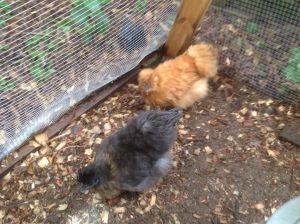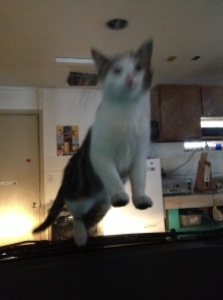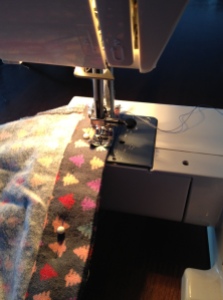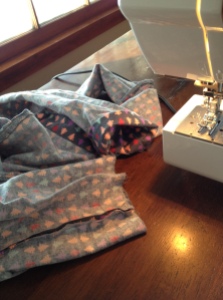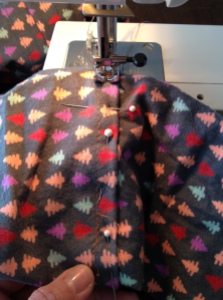We’ve had bad run of luck here with animals. But before I can tell you about it, I have to tell you about the transformation that’s been happening since we moved to our house two years ago.
We acquired our dog first, nothing unusual about that. Here he is (and yes, despite the scarf and painful cuteness, he is male):
And then this past spring we got chickens.
The chickens did well and after a few months we started to get eggs from them each day. We settled into a good pattern.
Then somehow my husband talked me into getting a kitten. It was going to stay in the garage and be an outside cat. We kept her out of the house (except when she snuck in), but I didn’t manage to keep her out of my stupid heart. I don’t even like cats! But she was irresistible. She ended up being fun all the way around for everyone; she had a great personality. The kids loved and hated the way she attacked their feet when they went out into the mudroom for their coats or backpacks. Even when she tripped us on the way out the door, it was because of love.
It was all going so well.
Two weeks ago, our kitty met an untimely demise in our garage. She darted across the garage as my husband slowly entered, and she misjudged her own speed and agility. Her death was quick, for which I was grateful.
When it happened and we realized there was no saving her, it was a study in child development to watch how my kids reacted. After about five minutes, my first grader and preschooler asked when we could get a new cat. They wanted to pet her and say goodbye, but it was more of a scientific observation. “Here is a dead cat” type of thing. However, my third grade son retreated to his room, where he asked if he could watch a video or read his book. His eyes were watery and he was upset.
I felt the same way. I wanted to pretend it hadn’t happened, and my first reaction was to find something that could distract me from being sad. I’m a happy gal usually, and feeling sadness is…well, a bummer. I noticed again that when dealing with a difficult situation, my gut reaction is to retreat.
When my son felt the sadness of loss, I didn’t want him to have to feel those emotions. I wanted to cheer him up (and myself too). However, rather than ignore or dull the experience, I took a different approach.
When children feel pain, it is important to assure them it isn’t the final thing they will feel.
Feelings can be scary and overwhelming. Parents can help them walk through the intensity.
Here are a couple suggestions:
- If you can, try to keep your own emotions somewhat in check. It can be scary for a child to see his parent openly distraught. Sharing some tears is healthy; asking your child to bear your grief is not.
- Assure your child that it is okay to feel sad, that it a strong feeling, much the same as anger (which my son and I have talked about in the past).
- Kids don’t need to hide from their feelings even though they were kindof overwhelming. The feeling “sad” is not a permanent emotion, and “happy” will return.
- I told my son it was good to be sad because he had loved the kitty and when pets we love die, we feel sad and will miss them.
We got through it. We aren’t getting another cat, even though my first grader seems to have one picked out in his mind. In another blog post, I plan to talk about the difference between the way we handle life and death with animals that we have for food production versus pets.
Was this helpful to you? I sure hope so. How do you deal with strong emotions and life lessons with your kids? I’d love to hear about it. But in parting, I’ll leave you with a photo of our kitten (almost cat) climbing up on our windshield:


